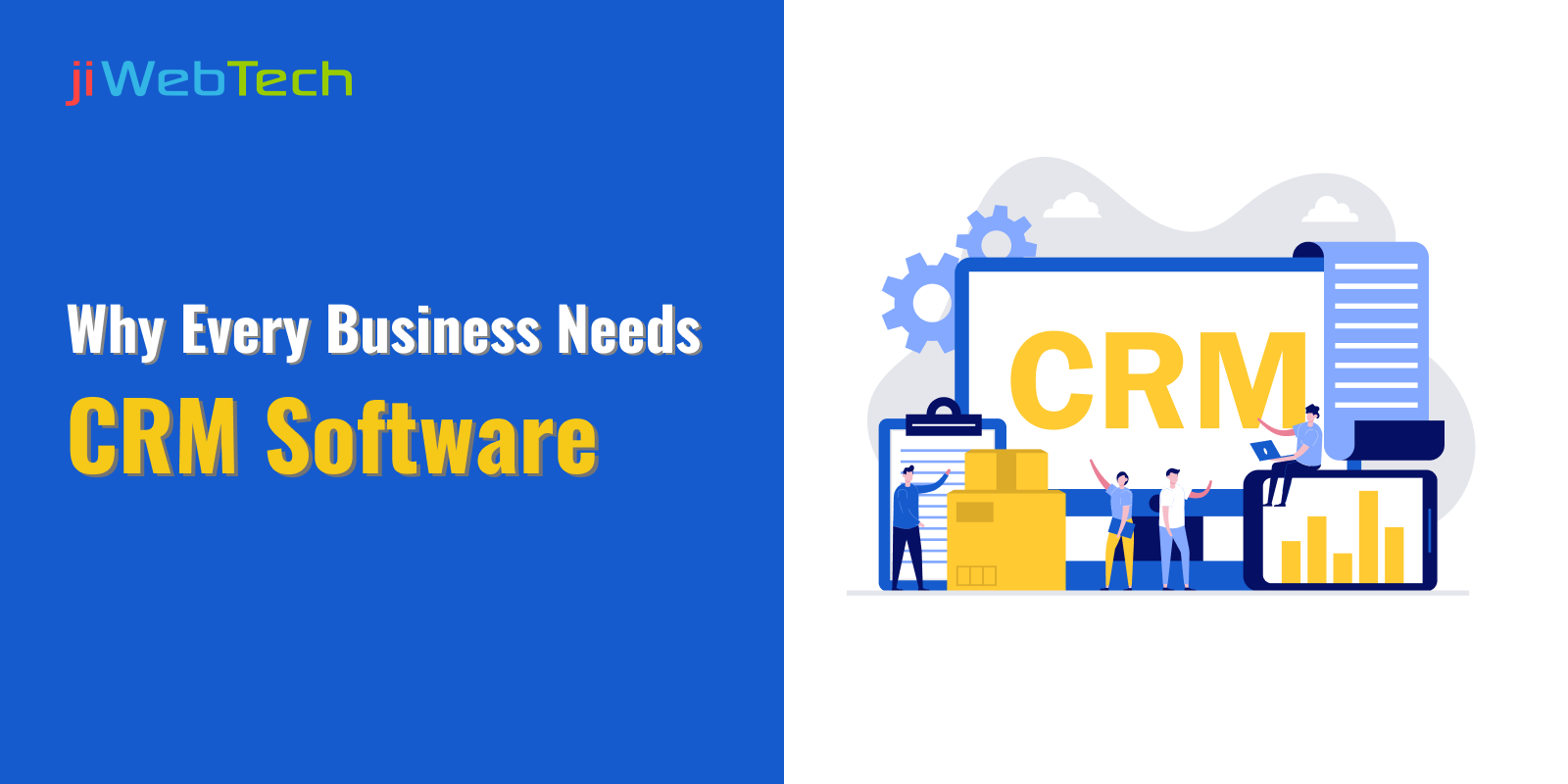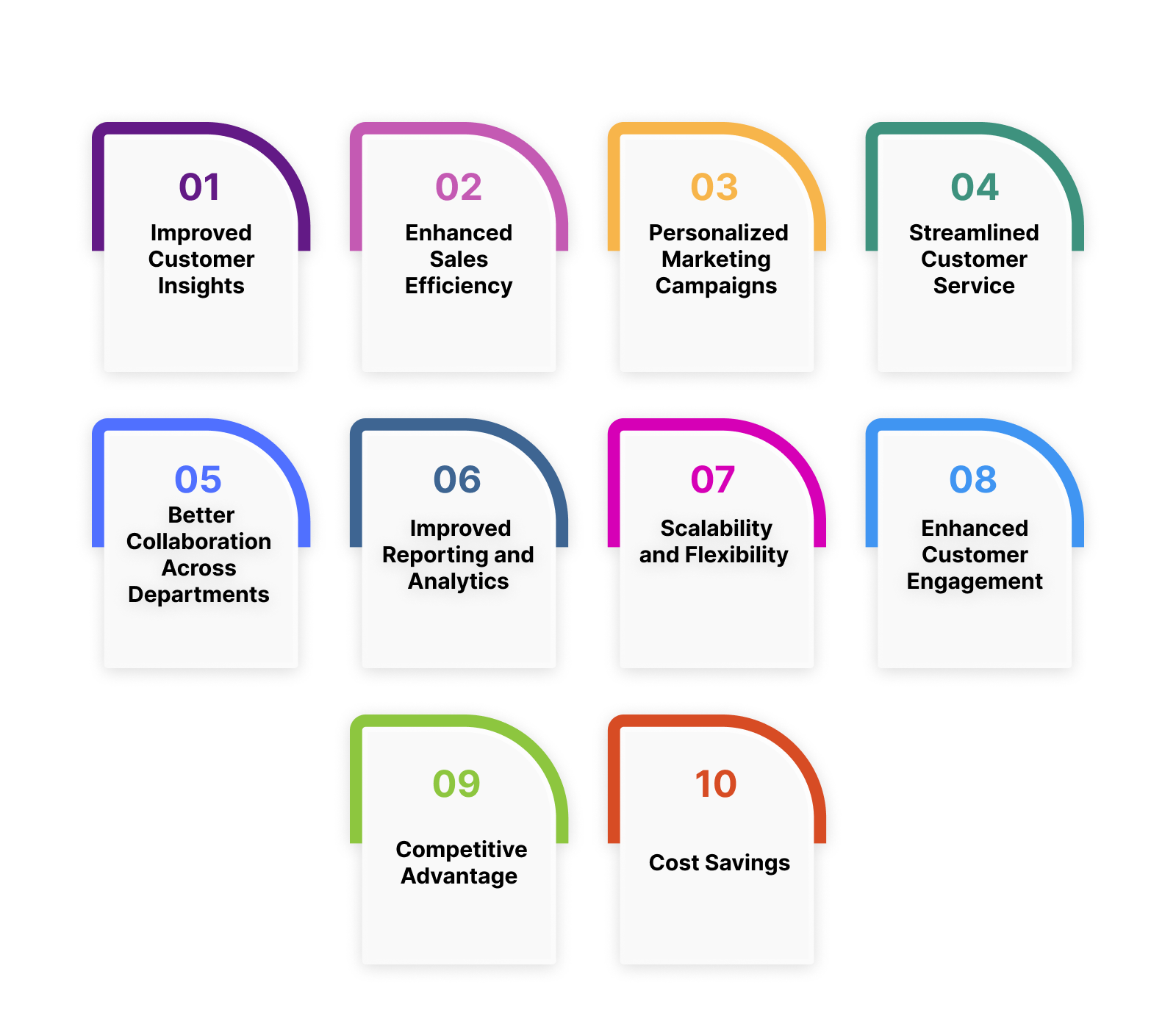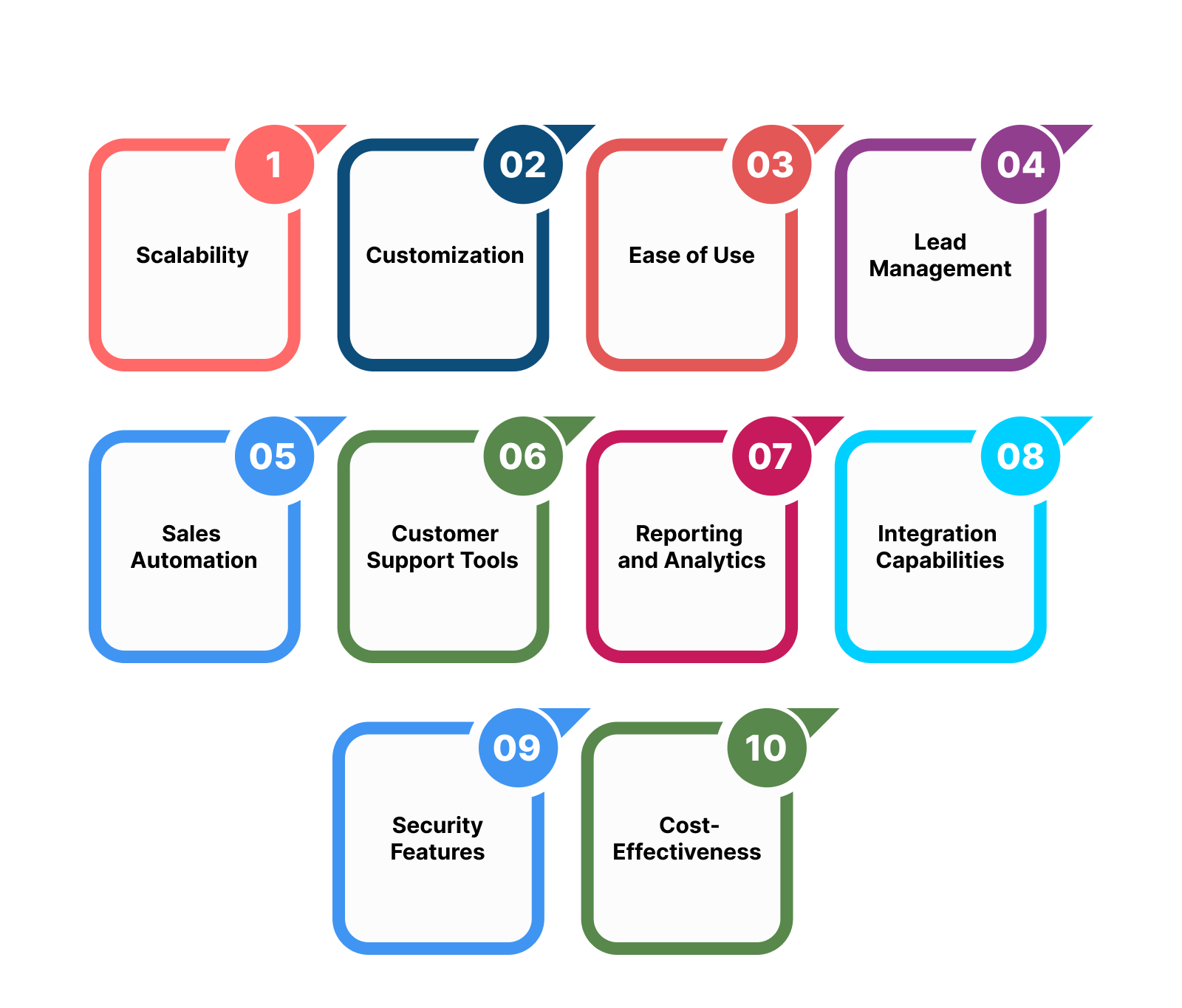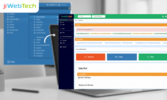- Jun 07, 2024
- Enterprise
- 3013
Share this post on:

In today's fast-paced and competitive business landscape, managing customer relationships effectively is crucial for long-term success. That's where CRM (Customer Relationship Management) software comes in. CRM applications have become essential for businesses of all sizes and industries. By managing customer interactions and data throughout the customer lifecycle, CRM Development Services helps companies improve customer satisfaction, retention, and overall profitability. A comprehensive Custom CRM Development Services helps businesses streamline their sales, marketing, and customer service operations, resulting in improved efficiency, productivity, and profitability.
Reasons to Look for Custom CRM Development Services
In this blog post, we will explore the reasons why businesses need CRM Development Services and how they can help them achieve their goals.

Improved Customer Insights
CRM applications provide a centralized platform for storing and analyzing customer data. By leveraging this data, businesses can gain valuable insights into customer behavior, preferences, and needs. With these insights, companies can tailor their marketing strategies to better target their audiences, improve product development, and enhance customer service. For instance, CRM applications can help identify the most profitable customer segments, enabling businesses to allocate resources more effectively.
Enhanced Sales Efficiency
A CRM system automates many sales tasks, such as lead tracking, opportunity management, and pipeline analysis. This helps sales teams focus on high-value activities like closing deals and building relationships with customers, resulting in increased productivity and revenue growth. With a CRM system in place, businesses can also set up customized workflows for their specific sales processes, streamlining their operations and saving time.
Personalized Marketing Campaigns
CRM software offers advanced segmentation capabilities that enable marketers to create highly targeted campaigns tailored to specific customer groups. By analyzing customer behavior and preferences, businesses can develop customized marketing messages, improving their overall effectiveness and ROI. With CRM-driven marketing automation, companies can also optimize their lead generation strategies, reducing the time and effort required for manual outreach and follow-up.
Streamlined Customer Service
A CRM system provides a single platform for managing customer service operations, including call center management, ticket tracking, and issue resolution. By automating many of these tasks, businesses can reduce response times, improve customer satisfaction, and increase loyalty. For instance, a CRM system can automatically assign tickets to the appropriate agent based on skillset or availability, ensuring prompt resolution.
Better Collaboration Across Departments
CRM software facilitates collaboration among various departments within an organization, such as sales, marketing, and customer service. By providing a shared platform for data access and communication, businesses can break down silos, reduce miscommunication, and improve coordination between teams. For example, a CRM system can enable sales representatives to share customer information with the marketing team, allowing them to create more targeted campaigns.
Improved Reporting and Analytics
CRM software offers advanced reporting and analytics capabilities that help businesses monitor their performance across various channels. By analyzing data on customer interactions, sales performance, and marketing effectiveness, companies can identify areas for improvement and make data-driven decisions. With CRM-based reporting, businesses can also track KPIs such as customer lifetime value, conversion rates, and revenue growth, providing valuable insights into their overall health.
Scalability and Flexibility
A good CRM system should be scalable and flexible enough to accommodate the growing needs of businesses over time. As a company expands its operations or introduces new products, the CRM system can adapt to these changes without disrupting existing processes. Additionally, CRM software can be customized to meet specific industry requirements or organizational structures, ensuring that it aligns with the unique needs of each business.
Enhanced Customer Engagement
By providing a single platform for customer interactions and data management, CRM software facilitates better engagement between businesses and their customers. This results in increased satisfaction and loyalty, as customers feel valued and cared for throughout their entire journey with the company. For instance, a CRM system can enable businesses to track customer feedback and sentiment, enabling them to respond promptly to any concerns or issues.
Competitive Advantage
In today's competitive marketplace, having a robust CRM system in place can provide a significant advantage over rivals. By leveraging advanced analytics and automation capabilities, businesses can differentiate themselves from their peers and achieve greater success in their respective industries. With a CRM system, companies can also gain an edge in the market by providing personalized experiences to customers, resulting in increased loyalty and retention.
Cost Savings
Implementing a CRM system can lead to significant cost savings for businesses over time. By automating many manual tasks and improving efficiency, companies can reduce labor costs and increase productivity. Additionally, CRM software can help businesses avoid expensive mistakes by identifying potential issues early on and minimizing the impact of any errors that occur.
Features to Look for in a CRM for Small Business

Customer Relationship Management (CRM) systems are essential tools for small businesses to manage their interactions with current and potential customers. As the market is flooded with various CRM options, it can be overwhelming for small business owners to choose the right one. Selecting a CRM that aligns with the specific needs and goals of a small business is crucial for its success. In this comprehensive guide, we will explore the key features that small businesses should look for when selecting a CRM system.
Scalability
One of the most important features to consider when choosing a CRM for a small business is scalability. As a business grows, its customer base and data management needs also expand. Therefore, it is essential to select a CRM system that can scale alongside the business. A scalable CRM will be able to accommodate an increasing number of customers, contacts, and interactions without compromising performance or requiring a complete overhaul of the system.
Scalability also extends to the ability of the CRM to integrate with other business systems and applications. Small businesses often use various software tools for different functions, such as accounting, marketing, and customer support. A scalable CRM should have the capability to integrate with these existing systems seamlessly, allowing for efficient data flow and process automation across the organization.
Customization
Every small business has unique processes, workflows, and customer engagement strategies. Therefore, it is crucial for a CRM system to offer a high degree of customization to adapt to the specific requirements of the business. Look for a CRM that allows custom fields, forms, and reports so that it can be tailored to match the business’s individual needs.
Customization also extends to user permissions and access controls. Small businesses often have teams with varying roles and responsibilities. A good CRM should provide flexible user management features that enable administrators to define different levels of access and permissions based on job roles within the organization.
Ease of Use
Small businesses typically do not have dedicated IT staff or extensive resources for training employees on complex software systems. Therefore, an intuitive and user-friendly interface is a critical feature to look for in a CRM. The system should be easy to navigate, with clear menu structures and a minimal learning curve for new users.
In addition to ease of use, mobile accessibility has become increasingly important in today’s business environment. A CRM that offers mobile apps or responsive web interfaces allows employees to access customer data and manage interactions while on the go, enhancing productivity and responsiveness.
Lead Management
Effective lead management is vital for small businesses aiming to convert prospects into paying customers. A robust CRM should provide comprehensive lead management capabilities, including lead capture from multiple sources such as website forms, social media inquiries, email campaigns, and offline events.
Lead scoring and qualification features are also valuable components of lead management within a CRM system. These tools help prioritize leads based on their likelihood to convert, enabling sales teams to focus their efforts on high-potential opportunities.
Sales Automation
Automation features can significantly streamline sales processes for small businesses. Look for a CRM that offers automation of repetitive tasks such as email communications, follow-up reminders, proposal generation, and pipeline management. Automation not only saves time but also ensures consistency in sales activities across the organization.
Furthermore, integration with communication channels like email and telephony can enhance sales automation by capturing all customer interactions within the CRM system automatically. This consolidated view of communication history provides valuable insights for sales teams when engaging with prospects and existing customers.
Customer Support Tools
For small businesses focused on delivering exceptional customer service, having robust customer support tools within their CRM is essential. Features such as ticketing systems, knowledge bases, live chat integration, and service level agreement (SLA) management contribute to the efficient handling of customer inquiries and issue resolution.
In addition to traditional support channels, modern CRMs may offer social media integration for monitoring and responding to customer queries across various social platforms. This holistic approach to customer support ensures that small businesses can maintain consistent communication with their customers regardless of the channel used.
Reporting and Analytics
Data-driven decision-making is critical for small businesses looking to optimize their operations and strategies. A CRM with robust reporting and analytics capabilities provides valuable insights into customer behavior, sales performance, marketing effectiveness, and overall business growth.
Look for features such as customizable dashboards, pre-built report templates, visual analytics tools, and forecasting modules within a CRM system. These functionalities empower small business owners and managers to track key metrics, identify trends, and make informed decisions based on real-time data.
Integration Capabilities
In today’s interconnected digital landscape, no single software solution can fulfill all the needs of a small business. Therefore, integration capabilities are crucial when selecting a CRM system. The ability to seamlessly integrate with other applications, such as email marketing platforms, e-commerce systems, accounting software, and productivity tools enhances the overall efficiency of business operations.
API (Application Programming Interface) availability is an important aspect of integration capabilities in a CRM. An open API allows developers to create custom integrations or automate data exchange between the CRM system and other applications used by the business.
Security Features
Protecting sensitive customer data is paramount for any small business handling personal information within its CRM system. When evaluating CRMs, consider security features such as role-based access controls, data encryption at rest and in transit, audit trails for data modifications, regular security updates, and compliance certifications (e.g., GDPR compliance for handling European Union data).
Additionally, cloud-based CRMs should adhere to industry-standard security protocols and best practices to ensure that customer data remains secure from unauthorized access or breaches.
Cost-Effectiveness
Last but not least, cost-effectiveness plays a significant role in selecting a CRM solution for small businesses with limited budgets. While considering the features mentioned above, it’s essential to evaluate the pricing structure of different CRM options carefully.
Some CRMs offer tiered pricing plans based on the number of users or features included, while others may follow a pay-as-you-go model or offer customizable packages tailored to specific business needs.
It’s important to consider not only the initial implementation costs but also ongoing expenses such as subscription fees, maintenance costs, training expenses, and potential scalability-related expenditures when assessing the overall cost-effectiveness of a CRM solution.
Conclusion
In conclusion, CRM applications are vital for businesses looking to streamline their operations, improve customer relationships, and drive long-term growth. By automating sales tasks, enhancing marketing campaigns, and providing a single platform for customer service and data management, CRM systems help businesses achieve greater efficiency, productivity, and profitability. Whether you're looking to scale your operations or simply improve customer satisfaction, investing in a comprehensive CRM system can make all the difference in your success. So, if you are looking for Custom CRM Development Services, look no further than jiWebTech. We provide comprehensive CRM software that enables businesses to enhance their operational efficiency and make informed decisions, ultimately driving productivity and profitability. Contact us to learn more.










